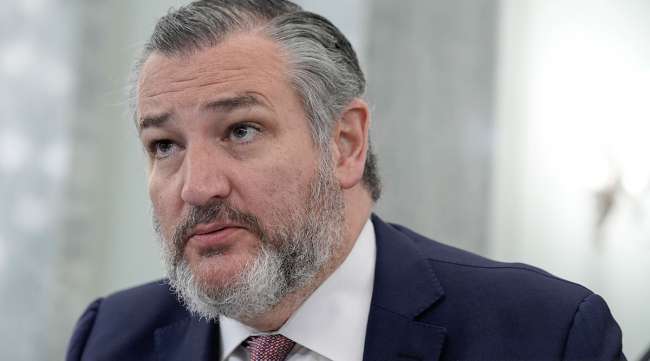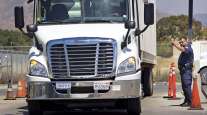Senior Reporter
Senate Republicans Ramp Up EV Resistance

[Stay on top of transportation news: Get TTNews in your inbox.]
Before leaving Washington for a six-week summer break, senior Senate Republicans again pushed back on the White House’s electric vehicle agenda.
During President Joe Biden’s tenure, his administration has met fierce opposition from the congressional Republican caucus specific to charging infrastructure for EVs as well as nontraditional fuel options.
On July 31, Texas Sen. Ted Cruz became the most recent senior Republican to sound the alarm on a regulatory agenda he claimed is akin to a declaration of “war against affordable gas-powered cars.” Cruz is the lead sponsor of a procedural measure known as a Congressional Review Act resolution meant to pause a new National Highway Traffic Safety Administration rule on fuel-economy standards.
More than two dozen fellow Republicans co-sponsored the resolution, including Sens. John Cornyn of Texas, Tom Cotton of Arkansas, Kevin Cramer of North Dakota, Mike Crapo of Idaho, Joni Ernst of Iowa and Josh Hawley of Missouri. A vote on the resolution awaits floor consideration. “I’m leading the effort in the Senate to stop radical environmentalists from both abusing the rulemaking process and trying to force electric vehicles on consumers who do not want them,” Cruz, ranking member on the Commerce Committee on freight policy, said last month.

Barrasso
Cruz’s resolution is the latest effort meant to halt the administration’s agenda to transition away from vehicles powered by fossil fuels. Led by Sen. John Barrasso (R-Wyo.), Republicans this summer introduced legislation that would require the Energy Department to rely on a set of specific criteria when calculating the efficiency of electric vehicles. The Recalculating Electric Vehicle Efficiency for Accuracy and Legitimacy Act, Barrasso observed, “is a needed step to help fight against the Biden administration’s continued manipulation of the auto market and put Americans back in the driver’s seat.”

Grassley
Sen. Chuck Grassley (R-Iowa), the Budget Committee’s ranking member, also is a critic. “EV drivers are currently free-riding on the backs of the middle class, although some states have instituted an extra fee for so-called fuel-efficient vehicles, making them even more expensive. There are many holes in the rapid EV transition fantasy,” Grassley said last month. “They include a lack of critical minerals needed to produce EVs, lack of transmission infrastructure needed to support their increased electricity demands and our current reliance on nefarious countries in the EV supply chain.”
Earlier this year, most congressional Republicans announced their support for another Congressional Review Act resolution. This one would pause a federal emissions rule for heavy-duty vehicles. “Rural communities around Idaho are not able to implement the massive grid expansion that would be needed to support the electrification of heavy-duty trucks. These vehicles consume roughly seven times as much electricity on a single charge as a typical home does in a day, and charging centers can require as much power from the electrical grid as a small city,” said Rep. Russ Fulcher (R-Idaho), a co-lead sponsor.
Jeff Loftus of FMCSA joins TT’s Seth Clevenger to discuss the current outlook on ADAS technology and how it will affect the industry at large. Tune in above or by going to RoadSigns.ttnews.com.
“Infrastructure aside, electric trucks cost roughly twice as much as diesel trucks, and these vehicles are not able to haul nearly as much,” the congressman continued.
In June, NHTSA issued a final rule on vehicle fuel-economy standards designed to achieve fuel-related savings of more than $23 billion as well as reduce pollution along mobility corridors, per background information the Transportation Department provided.
RELATED: Perspective: EPA’s GHG Phase 3 Rule Needs Fixing
“Not only will these new standards save Americans money at the pump every time they fill up, they will also decrease harmful pollution and make America less reliant on foreign oil,” Transportation Secretary Pete Buttigieg said June 7. “These standards will save car owners more than $600 in gasoline costs over the lifetime of their vehicle.”

Shulman
NHTSA Deputy Administrator Sophie Shulman added: “These new fuel-economy standards will save our nation billions of dollars, help reduce our dependence on fossil fuels and make our air cleaner for everyone. Americans will enjoy the benefits of this rule for decades to come.”
At a hearing last month, Jeff Davis, senior fellow at the Eno Center for Transportation, reminded senators that the future of a highway account backed by revenue from fuel taxes is uncertain amid EVs’ growing popularity. As he put it, “The revenue damage done to the Highway Trust Fund should be at least a part of the debate when Congress is discussing advancing electric vehicles.
“It is long past time for Congress to either strengthen, or else abandon, the user-pay model for surface transportation since electrification is accelerating the demise of fossil fuel taxes, and the underlying goal of zero-emission transportation by 2050 would inherently eliminate fossil fuel taxation as a revenue stream.”
.@USDOTFHWA leader Shailen Bhatt pressed federal lawmakers to consider a vast portfolio of applications designed to enhance safety along commercial and passenger corridors. #FHWA #safety #commercialtrucking #transportation
For the full story, visit: https://t.co/xqFSSEXpaD pic.twitter.com/IXsQ10JWIn — Transport Topics (@TransportTopics) June 20, 2024
Overall, via the Infrastructure Investment and Jobs Act and the Inflation Reduction Act, the White House has committed billions of dollars for modernizing transportation mobility options as well as tackling the impact of climate change. White House climate adviser Ali Zaidi argued, “These fuel-economy standards, rigorously aligned with our investments and standards across the federal government, deliver on the Biden-Harris administration’s promise to build on this momentum and continue to spur job creation and move faster and faster to tackle the climate crisis.”
Want more news? Listen to today's daily briefing below or go here for more info:





